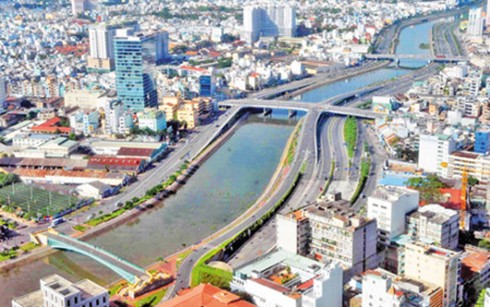(VOVworld) – Southern key economic region, one of Vietnam’s four major economic regions, has contributed greatly to the national growth. But this region hasn’t done well in the transport connectivity between its localities.
 |
| Transport infrastructure in Ho Chi Minh city |
Southern key economic region includes 8 provinces and cities: Ho Chi Minh city, Dong Nai, Ba Ria-Vung Tau, Binh Duong, Binh Phuoc, Tay Ninh, Long An, and Tien Giang. Although the region accounts for 8% of Vietnam’s area and its population accounts for 17% of the national population, it has attracted more than half of foreign investment capital into Vietnam and contributed 60% of the national GDP. The connectivity of this economic region has created an essential socio-economic infrastructure system such as bridges, roads, schools, and clinics. However, the biggest obstacle for the region’s development is the transport connectivity between local cities and provinces. Artery trade routes from Ho Chi Minh city to Binh Duong, Dong Nai, Vung Tau, and Tien Giang are overloaded, adversely affecting good’s circulation. Nguyen Thanh Phong, Chairman of Ho Chi Minh city’s People’s Committee said: “Ho Chi Minh city will invite neighboring provinces do discuss how to improve regional transport connectivity. Transport between Ho Chi Minh city and Binh Duong and Long An provinces is poor. A meeting on this issue will be convened soon.”
The development of land, water, railway and air routes should be taken into consideration. Nguyen Thanh Lam, Vice Chairman of Ba Ria-Vung Tau People’s Committee, said: “If the transport system is not improved, it’s difficult to turn our region into a dynamic growth momentum. So, it’s necessary to build a railway route from Ho Chi Minh city to Long Thanh and Vung Tau, or at least to Cai Mep-Thi Vai port’s industrial zone.”
Cities and provinces in the southern key economic region have proposed the government to finance the region’s transport system, with priority given to connectivity to airports and seaports.